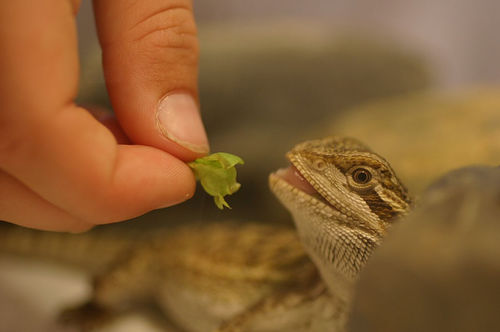Bearded Dragon Playing Dead: Everything You Need to Know
Bearded Dragon Playing Dead: A Beginner’s Guide
If you’re the proud owner of a bearded dragon, you’ve probably observed your pet’s peculiar behavior at one point or another. Have you ever seen your bearded dragon lying flat on its back, completely still and motionless? It’s common for bearded dragons to play dead, a behavior that can be shocking and concerning for new owners.
Why Do Bearded Dragons Play Dead?
Bearded dragons play dead for a variety of reasons, but the most common is to avoid danger. Playing dead makes bearded dragons appear unappetizing or dead to potential predators, reducing their chances of being attacked. This is a natural instinct that is passed down from their wild ancestors.
Another reason why bearded dragons play dead is to regulate their body temperature. When bearded dragons are too hot, they may play dead to cool off. Lying flat on their back exposes their belly, which allows more heat to escape from their body. This is particularly common during the hot summer months.
Lastly, bearded dragons may play dead to show submission. This behavior is common when a dominant bearded dragon is present. The submissive bearded dragon will play dead to avoid confrontation or aggressiveness from the dominant bearded dragon.
Is Bearded Dragon Playing Dead a Cause for Concern?

Bearded dragon playing dead is completely normal behavior and should not be a cause for concern. As a pet owner, it’s important to observe your pet’s behavior and be familiar with their normal habits. If your bearded dragon spends most of its time basking in the sun or exploring during the day, playing dead occasionally is nothing to worry about.
However, if your bearded dragon is playing dead more frequently than usual, it may be a sign of underlying health issues. In this case, it’s important to consult with an exotic pet veterinarian for proper diagnosis and treatment.
How to Handle Your Bearded Dragon Playing Dead
It can be alarming and even scary to see your bearded dragon play dead. However, it’s important not to panic or disturb your pet during this time. Your bearded dragon is simply trying to avoid danger or regulate its body temperature, and typically will return to its normal behavior in a few minutes.
If you do need to touch your bearded dragon during this time, do so very gently and avoid sudden movements. Bearded dragons can be easily startled, and this can cause additional stress and potentially harm your pet.
It’s also important not to force your bearded dragon out of its playing dead state. Allow your pet to regulate its own behavior and come out of the state naturally. Be patient and observe your pet’s behavior to make sure it returns to its normal state.
Tips for Preventing Bearded Dragon Stress

Bearded dragons are social animals, and spending time with your pet can help prevent stress and anxiety. Here are a few tips for preventing bearded dragon stress:
- Provide a comfortable habitat with plenty of hides and basking spots.
- Maintain a consistent feeding schedule and provide a variety of fresh foods.
- Avoid sudden movements or loud noises around your pet.
- Handle your bearded dragon gently, and avoid grabbing or squeezing its body.
- Ensure that the temperature and lighting in its habitat are appropriate for its needs.
Conclusion
Bearded dragons playing dead can be a concerning and confusing behavior for new pet owners, but it’s simply a natural behavior to avoid danger and regulate their body temperature. As a pet owner, it’s important to observe your pet’s behavior and be familiar with their normal habits. If your bearded dragon is playing dead more frequently than usual, consult with an exotic pet veterinarian. By following the tips outlined in this article, you can ensure that your bearded dragon stays happy and healthy in their habitat.
